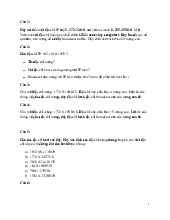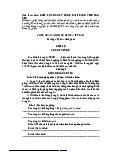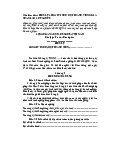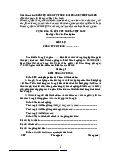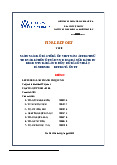



Preview text:
Questions and Answers Section 1 Question:
When an IP Office or an applicant or holder sends communication to WIPO concerning an
international application or registration, that communication must be in one of the working
languages of the Madrid System, irrespective of the language in which the international
application was filed. However, there are two exceptions to this rule. What are those exceptions? Answer: Those exceptions are:
Where a notification of provisional refusal (whether ex off or based on opposition) icio
refers to an application or registration of a conflicting mark in the territory concerned,
the list of goods and services covered by the conflicting mark can be in the language of
that application or registration.
Where a Contracting Party has notified WIPO that it requires a declaration of intention
to use the mark, it may require that the declaration be specifically in one of the three
working languages of the Madrid System, irrespective of the language in which the
international application was filed. Question:
Any notification concerning an international application or registration that WIPO sends to an
applicant or holder will be in the language in which the international application was filed. Is
this always the case? Please explain your answer. Answer:
No, this is not always the case.
An applicant or holder may notify WIPO that they wish to receive all such notifications in
English, French or Spanish, irrespective of the language in which the international application
was filed. The applicant can simply check the relevant box in the international application form
to make such a request. A similar box is made available for the new owner in the MM5 form for changing ownership. Question:
Communications between WIPO and national or regional IP Offices may be in typed or
otherwise printed writing or in the form of electronic transmission of data. The communications
in writing can be sent to WIPO by mail (in hard copies) or by electronic means.
What is WIPO’s preferred method of receiving correspondence? Answer:
WIPO’s preference is to receive correspondence by electronic means.
WIPO actively encourages all users of the Madrid System to communicate electronically, and has
provided a number of online systems and services to enable this type of communication.
WIPO encourages IP Offices to send their communications preferably through the XML
exchange with WIPO, or via Madrid Office Portal (MOP) or the Contact Madrid service. Section 2 Question:
Madrid eFiling is a web-based filing system that allows for the easy filing of international
applications electronically. It consists of a module for applicants and a module for Offices of
origin. When used what benefits does this system provide to applicants and to an Office of origin? Answer: Benefits to the Applicant
An applicant is able to file an international application electronically just as they would
with the MM2 form. The information provided in the applicant’s basic mark is
automatically imported into their international application and once complete, the
application is sent to their national or regional IP Office for certification.
An applicant can also save a partially completed application to return to at a later time.
Benefits to the Office of origin
The Office of origin module allows Offices to review, validate, and certify that the
information contained in the international application corresponds with the basic
application or registration before transmitting to WIPO. Question:
The Madrid Office Portal (MOP) is an online service providing IP Offices with comprehensive
electronic access to the International Register of Marks and a means of electronic communication with WIPO.
What can IP Offices access in the Madrid Office Portal? Answer:
The Madrid Office Portal provides IP Offices access to:
Real-time status of examination and registration processes,
WIPO’s back office systems and official documents received by WIPO,
Decisions from designated Contracting Parties – grants of protection, provisional refusals, etc.,
Irregularity notices issued by WIPO and responses to the notices, and
Other documents, including all MM forms and decisions, such as grants of protection,
provisional refusals, final decisions, notifications of ceasing of effects of the basic mark, etc. Question:
What is the most effective way to connect with the Madrid Customer Service team to ask
questions, submit various requests and reply to irregularity letters under the Madrid System? Answer:
The most effective way to connect with the Madrid Customer Service team is through the Contact Madrid service. Section 3 Question:
WIPO will accept and respond to general letters and requests that do not require the use of an official form.
What details must the sender include in this type of communication? Answer:
The sender must include the following details in their correspondence:
The details of the international application or registration the general letter or request
relates to, including international registration number or number of the basic application or registration, Details of the mark,
Applicant’s or holder’s details, and
The contact details of the sender. Question:
If a time limit for a communication with WIPO is not met due to an irregularity in a postal or
delivery services, or in communications sent electronically, will the correspondence still be accepted? Answer:
Failure to meet time limits will only be excused if sufficient evidence (to the satisfaction of
WIPO) is provided by the sender to show that the delay was the result of circumstances outside of their control.
